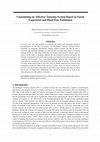Papers by Ebrahim Mousavi

Cornell University - arXiv, Nov 21, 2021
In recent years, the main problem in e-learning has shifted from analyzing content to personaliza... more In recent years, the main problem in e-learning has shifted from analyzing content to personalization of learning environment by Intelligence Tutoring Systems (ITSs). Therefore, by designing personalized teaching models, learners are able to have a successful and satisfying experience in achieving their learning goals. Affective Tutoring Systems (ATSs) are some kinds of ITS that can recognize and respond to affective states of learners. In this study, we designed, implemented, and evaluated a system to personalize the learning environment based on the facial emotions recognition, head pose estimation, and cognitive style of learners. First, a unit called Intelligent Analyzer (AI) created which was responsible for recognizing facial expression and head angles of learners. Next, the ATS was built which mainly made of two units: ITS, IA. Results indicated that with the ATS, participants needed less efforts to pass the tests. In other words, we observed when the IA unit was activated, learners could pass the final tests in fewer attempts than those for whom the IA unit was deactivated. Additionally, they showed an improvement in terms of the mean passing score and academic satisfaction.

Cornell University - arXiv, Aug 10, 2021
The cost of head pose labeling is the main challenge of improving the fine-grained Head Pose Esti... more The cost of head pose labeling is the main challenge of improving the fine-grained Head Pose Estimation (HPE). Although Self-Supervised Learning (SSL) can be a solution to the lack of huge amounts of labeled data, its efficacy for finegrained HPE is not yet fully explored. This study aims to assess the usage of SSL in fine-grained HPE based on two scenarios: (1) using SSL for weights pre-training procedure, and (2) leveraging auxiliary SSL losses besides HPE. We design a Hybrid Multi-Task Learning (HMTL) architecture based on the ResNet50 backbone in which both strategies are applied. Our experimental results reveal that the combination of both scenarios is the best for HPE. Together, the average error rate is reduced up to 23.1% for AFLW2000 and 14.2% for BIWI benchmark compared to the baseline. Moreover, it is found that some SSL methods are more suitable for transfer learning, while others may be effective when they are considered as auxiliary tasks incorporated into supervised learning. Finally, it is shown that by using the proposed HMTL architecture, the average error is reduced with different types of initial weights: random, ImageNet and SSL pre-trained weights.

In recent years, the main problem in e-learning has shifted from analyzing content to personaliza... more In recent years, the main problem in e-learning has shifted from analyzing content to personalization of learning environment by Intelligence Tutoring Systems (ITSs). Therefore, by designing personalized teaching models, learners are able to have a successful and satisfying experience in achieving their learning goals. Affective Tutoring Systems (ATSs) are some kinds of ITS that can recognize and respond to affective states of learners. In this study, we designed, implemented, and evaluated a system to personalize the learning environment based on the facial emotions recognition, head pose estimation, and cognitive style of learners. First, a unit called Intelligent Analyzer (AI) created which was responsible for recognizing facial expression and head angles of learners. Next, the ATS was built which mainly made of two units: ITS, IA. Results indicated that with the ATS, participants needed less efforts to pass the tests. In other words, we observed when the IA unit was activated, l...
Uploads
Papers by Ebrahim Mousavi